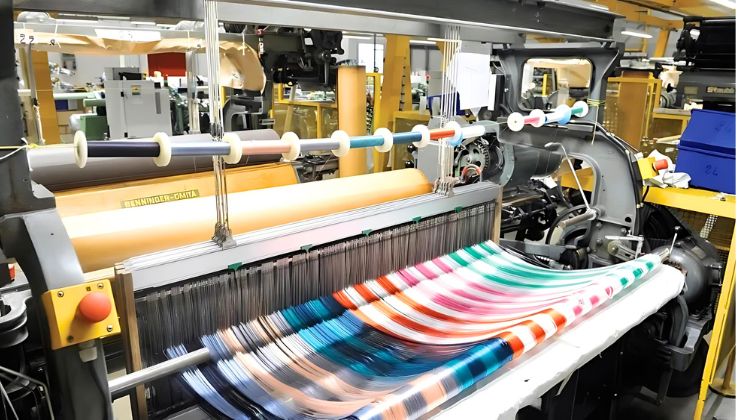The textile manufacturing industry is a dynamic and innovative field, constantly evolving to meet global demands. Today, textile manufacturers are leveraging cutting-edge technologies and sustainable practices to stay competitive and address consumer expectations. This article highlights the latest trends in the industry, explores the advancements shaping 2024, and examines why Italian textile manufacturers continue to lead the global market.
Summary
- Innovation and Adaptability: How to Revolutionise the Industry
- Emerging Trends in 2024: Rediscovering Environmental Responsibility
- Italian Excellence: Made in Italy as a Symbol of Quality
- How to shape the future of Textile Manufacturing?
Innovation and Adaptability: How to Revolutionise the Industry
Textile manufacturers are operating in an increasingly competitive and fast-paced market, where staying ahead requires innovation and adaptability. Embracing modern technologies and practices is essential for long-term success. Smart textiles are revolutionizing the industry with fabrics that integrate sensors and other responsive materials, serving purposes beyond traditional clothing, including monitoring health metrics or enhancing athletic performance. Sustainability is no longer optional for textile manufacturers, as companies adopt eco-friendly technologies like waterless dyeing and focus on recycled or organic materials to reduce environmental impacts and appeal to conscious consumers. Customization has also become a key differentiator, enabling manufacturers to meet specific market needs. Technologies like digital printing and on-demand production make it possible to produce unique designs efficiently while minimizing waste. Through these strategies, textile manufacturers are not only addressing current challenges but also positioning themselves as leaders in an ever-changing industry.
Emerging Trends in 2024: Rediscovering Environmental Responsibility
The textile industry is undergoing significant transformations, with new trends emerging to meet the demands of 2024. These developments reflect a combination of technological innovation and environmental responsibility. Recycling has taken center stage, with manufacturers adopting advanced techniques to convert used textiles into high-quality materials. This trend supports a circular economy by reducing waste and conserving resources. Artificial Intelligence (AI) is playing a growing role in optimizing production, enhancing efficiency and accuracy through predictive analytics and quality control, while automation reduces labor costs and errors. Functional textiles, designed for specific applications like UV protection, antimicrobial properties, and temperature regulation, are in high demand, catering to industries ranging from healthcare to outdoor sports. Additionally, digital technologies are transforming textile manufacturing. Industry 4.0 tools, such as IoT devices and real-time data analytics, improve transparency and efficiency, helping manufacturers respond quickly to market changes. Companies like Jersey Lomellina exemplify how advanced techniques and a commitment to sustainability are reshaping the industry, highlighting the potential of combining cutting-edge technology with eco-friendly practices. These trends are driving the textile industry toward a future that prioritizes innovation, sustainability, and responsiveness.
Italian Excellence: Made in Italy as a Symbol of Quality
Italian textile manufacturers have long been recognized as global leaders in quality and innovation. The label “Made in Italy” is a symbol of craftsmanship, luxury, and sustainability. Italy’s textile tradition is rooted in centuries of expertise, with generations of artisans perfecting the art of creating exquisite fabrics, ensuring the country’s reputation for superior quality. Italian manufacturers balance their historical craftsmanship with modern advancements, incorporating state-of-the-art technologies such as sustainable production methods and high-performance fabrics to remain at the forefront of the industry. Sustainability and ethical leadership are central to Italian textile producers, who adopt practices that minimize environmental impact and set benchmarks with their innovative and eco-friendly approaches to textile production. Italian textiles are sought after worldwide, appealing to luxury fashion brands and technical textile users alike. The combination of unmatched quality, unique designs, and environmental responsibility makes Italian producers an enduring force in the global market. By consistently delivering excellence, Italian textile manufacturers continue to dominate the industry and set the standard for others to follow.
How to Shape the Future of Textile Manufacturing?
The textile manufacturing industry is in a constant state of evolution, driven by emerging technologies, sustainable practices, and changing consumer preferences. Trends like smart textiles, advanced recycling, and AI-driven automation are shaping the future of the sector. Amidst these changes, Italy remains a beacon of excellence in textile manufacturing. Italian producers blend tradition, innovation, and environmental responsibility, cementing their reputation as global leaders. Companies like Jersey Lomellina exemplify these values, showcasing the industry’s potential to innovate while maintaining high standards of quality and sustainability.
Keep an eye for more latest news & updates on Vents Fashion!

